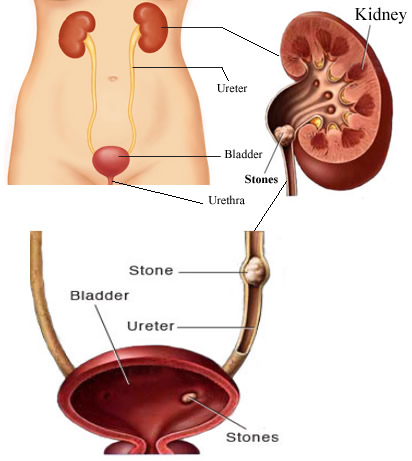Connection between Gout and Kidney Stones
Gout is a joint disease, closely related to the deposits of needle-like crystals (derived from high uric acid in the blood) that cause inflammation in the joint. Fortunately, it is very treatable and even some sufferers never have another flare-up after following appropriate treatment plan. However, if it is not well controlled, it can cause kidney disease, such as kidney stones.
Normally, you have a pair of kidneys (left and right, in the back of abdomen). The size is similar to a fist, about 4-5 inches in length.
 The blood circulation is so crucial to distribute O2 and nutrients to cells of the body, and carry waste products to the kidneys to be removed with urine. A pair of your kidneys is important to maintain the balance of fluid and electrolytes in the body, too.
The blood circulation is so crucial to distribute O2 and nutrients to cells of the body, and carry waste products to the kidneys to be removed with urine. A pair of your kidneys is important to maintain the balance of fluid and electrolytes in the body, too.
The kidney has lots of microscopic filter unit called nephrons. There are million nephrons in each kidney.
As the kidneys work and filter waste products from the blood, they make urine. Then urine and the waste products will go to the bladder through ureters, which then eventually will go away from the body when you pee.
There are numerous conditions that can affect the kidneys, and kidney stones are one of them. Unfortunately, in some cases, a significant drop of kidney function (about almost 90%) can go without any symptoms, particularly true at early stage of the problem.
Now you know that your kidney is a vital organ to filter waste products or unusual substances from the bloodstream. While the poor performance of the kidneys can affect the health of your blood flow, problems related to the blood flow can affect the health of your kidneys, too.
For instance, chronic kidney problem can lead to fluid retention, and this will contribute to cause your blood pressure to rise. The same goes for hypertension (high blood pressure), poorly-controlled hypertension can lead to damage to the kidneys.
How about in gout? As noted before, this arthritis is caused by the movement of high uric acid from the bloodstream to the joint and accumulates in there. Over time, this accumulation causes build-ups of crystals, causing inflammation and you have a gout attack.
Experts believe that people with gouty arthritis have greater tendency of having elevated level of uric acid. In long term management issue, managing the level of this acid as normal as possible is the major goal.
Nevertheless, not all individuals with high uric acid experience a gout attack. Again, the key is the movement of uric acid to the joint. As long as there is no any excess uric acid that goes to the joint, you will not experience the attack of this arthritis!
But the joint is not the single destination from excess uric acid to stay. Sometime it may accumulate into the urinary tract, too – increasing the risk of uric acid stones.
The imbalance of minerals in urine can become stones /crystals. Fortunately, normally the body has its own mechanism to prevent stones from forming. If the stones do occur, they usually will pass on their own.
However, depending on the large of the stones, sometime they can block the flow of the urine. For this case, medical intervention is usually required to make the problem resolve.
And people with gouty arthritis are at high risk of kidney disease (uric acid stones), particularly if their uric acid level is poorly controlled, as noted before. In other words, the chronic episodes of high uric acid can increase the risk of uric acid stones to develop in the urinary tract.
The signs and symptoms of having stones in the urinary tract are dependent on the severity of the problem, these may include:
- Vague symptoms, such as fever, nausea, and vomiting.
- Persistent urge to pee, this may be followed with difficulty passing urine.
- Pain when you urinate.
- Changes in the urine, such as in smell and color.
- Pain may spread to below the ribs, groin, side & back, or lower abdomen.
When it comes to diet for both diseases, drinking plenty of water is the first essential thing you need to always remember!
With adequate water, your kidney can work better in removing and filtering waste products (including excess uric acid) in the blood. In long term, drinking adequate water every day (about 1.8 to 4 litters) is great way to maintain the health of your kidneys.
And to cope with gout, you need to restrict your diet from any foods very high in purines, too. And if you have high tendency of having oxalate stones (another form of kidney stones), your doctor may ask you to restrict foods high in oxalate!
For more detailed information about foods you need to avoid and you can eat safely to cope with gout and uric acid stones, see this helpful guide!




